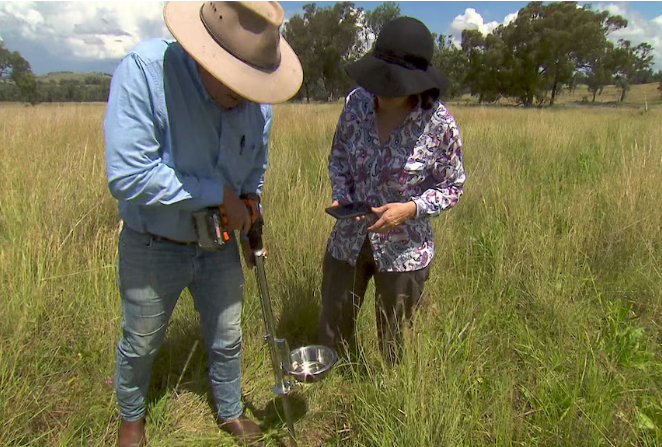June 18, 2025 | 15:14 GMT +7
June 18, 2025 | 15:14 GMT +7
Hotline: 0913.378.918
June 18, 2025 | 15:14 GMT +7
Hotline: 0913.378.918

Farmers are measuring the carbon stored in their paddocks.
Carbon sink is the term used to describe a site that absorbs more carbon than it emits.
Net Zero Emissions Agriculture Cooperative Research Centre researcher Warwick Badgery said a 10-year trial looking at how much carbon could be stored on grazing properties found the amount was "negligible".
"The level of soil carbon change that we see is around 0.1 tonne of carbon per hectare per year, when we compare it to continuous grazing in the same situation," Mr Badgery said.
Regenerative farming has been championed as a way of increasing the vegetation on farms to increase the carbon stored in the soil.
But Mr Badgery said the results had been "over-hyped".
"Our team reviewed the literature on regenerative grazing and that found there was no significant difference with conventional grazing operations," he said.
He said farmers were still grappling with how they could get their own emissions down to zero, let alone store carbon for the big polluters.
"We don't currently have viable ways to reduce methane in grazing enterprises, which is 97 per cent of our livestock systems," Mr Badgery said.
Farmers have been trialling feed supplements to reduce methane emissions from cattle but Mr Badgery said the additives were only working well in intensive operations such as feedlots and dairies.
University of Sydney soil scientist Budiman Minasny was more optimistic.
Dr Minasny said results of long-term trials might be explained if there was little change in land management practices.
"We cannot see much difference if the soil carbon has reached a steady-state," he said.
"There needs to be new regenerative practices to lift the current carbon level to the next level up."
But he said agriculture should not be expected to offset carbon emissions from big polluters.
"Soil carbon sequestration should be part of the solution to reach net zero in agriculture and improve soil conditions in Australia," Dr Minasny said.
Under the Paris Agreement on Climate Change, Australia committed to reach net zero emissions by 2050 but emissions in sectors such as transport are still rising.
The government's Climate Change Authority released an Annual Progress Advice Report in October 2023 that found Australia was not on track yet to meet its 2030 emissions reduction target.
It showed Australia's greenhouse gas emissions were 467 million tonnes in the year ending June 2023, an increase of four million tonnes on the previous year.
Australian Climate and Biodiversity Foundation chair Ken Henry said he was deeply concerned.
"It seems extremely likely to me that five of the six sectors are still going to be net carbon emitters by 2025," Dr Henry said.
He said agriculture was the only sector that had a chance of getting to net zero.
He said in order for Australia to achieve its target, every farm in the country would need to set land aside to plant trees and create a "carbon sink" to store the emissions from the other sectors.
Dr Henry said farmers needed options to generate income from carbon storage.
"We have to provide landholders with choices ... about what they do with their land and these choices have to include choices to use part of the property to store carbon," he said.
Dr Henry said stored carbon should then be put on the national ledger, with farmers getting a tradeable credit.
Some farmers feel uncertain about the Australian Carbon Credit market.
Wendy Mayne, whose family runs an Angus cattle operation at Warialda, in northern New South Wales, said she hadn't applied for carbon credits.
"We've been down that carbon journey for about 20 years ... we've been planting multi-species crops and using organically based mineralised fertilisers," she said.
Ms Mayne said she wanted to see more data on how much could be stored in the soil and for how long.
Uralla wool grower Robert Dougherty said he had been working for more than a decade on Balala Station to improve his farm's overall biodiversity.
He said it was ultimately consumers who would decide how much natural capital like carbon sequestration was worth.
"I believe consumers will change this whole story, not politics, not government," Mr Dougherty said.
(ABCNews)

(VAN) Extensive licensing requirements raise concerns about intellectual property theft.

(VAN) As of Friday, a salmonella outbreak linked to a California egg producer had sickened at least 79 people. Of the infected people, 21 hospitalizations were reported, U.S. health officials said.

(VAN) With the war ongoing, many Ukrainian farmers and rural farming families face limited access to their land due to mines and lack the financial resources to purchase needed agricultural inputs.

(VAN) Vikas Rambal has quietly built a $5 billion business empire in manufacturing, property and solar, and catapulted onto the Rich List.

(VAN) Available cropland now at less than five percent, according to latest geospatial assessment from FAO and UNOSAT.

(VAN) Alt Carbon has raised $12 million in a seed round as it plans to scale its carbon dioxide removal work in the South Asian nation.

(VAN) Attempts to bring down the price of the Japanese staple have had little effect amid a cost-of-living crisis.